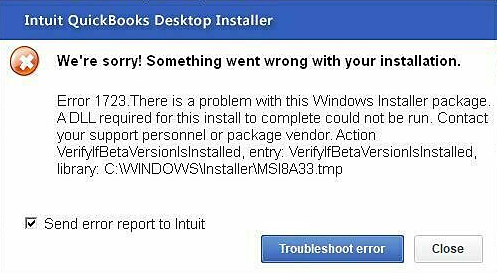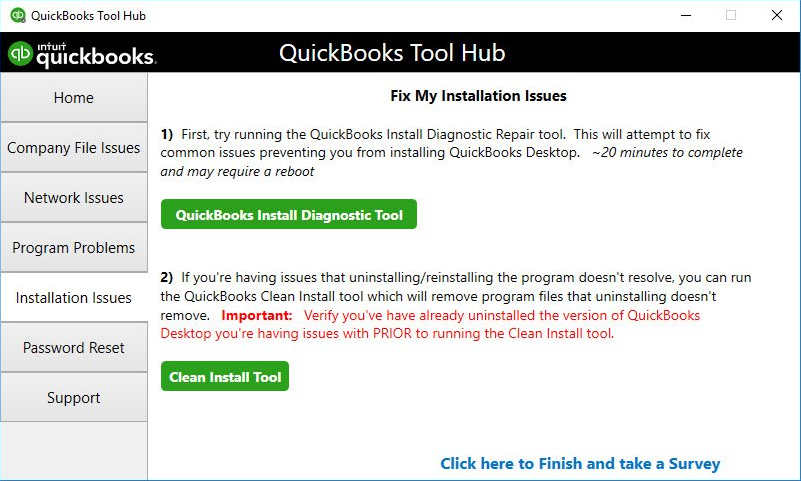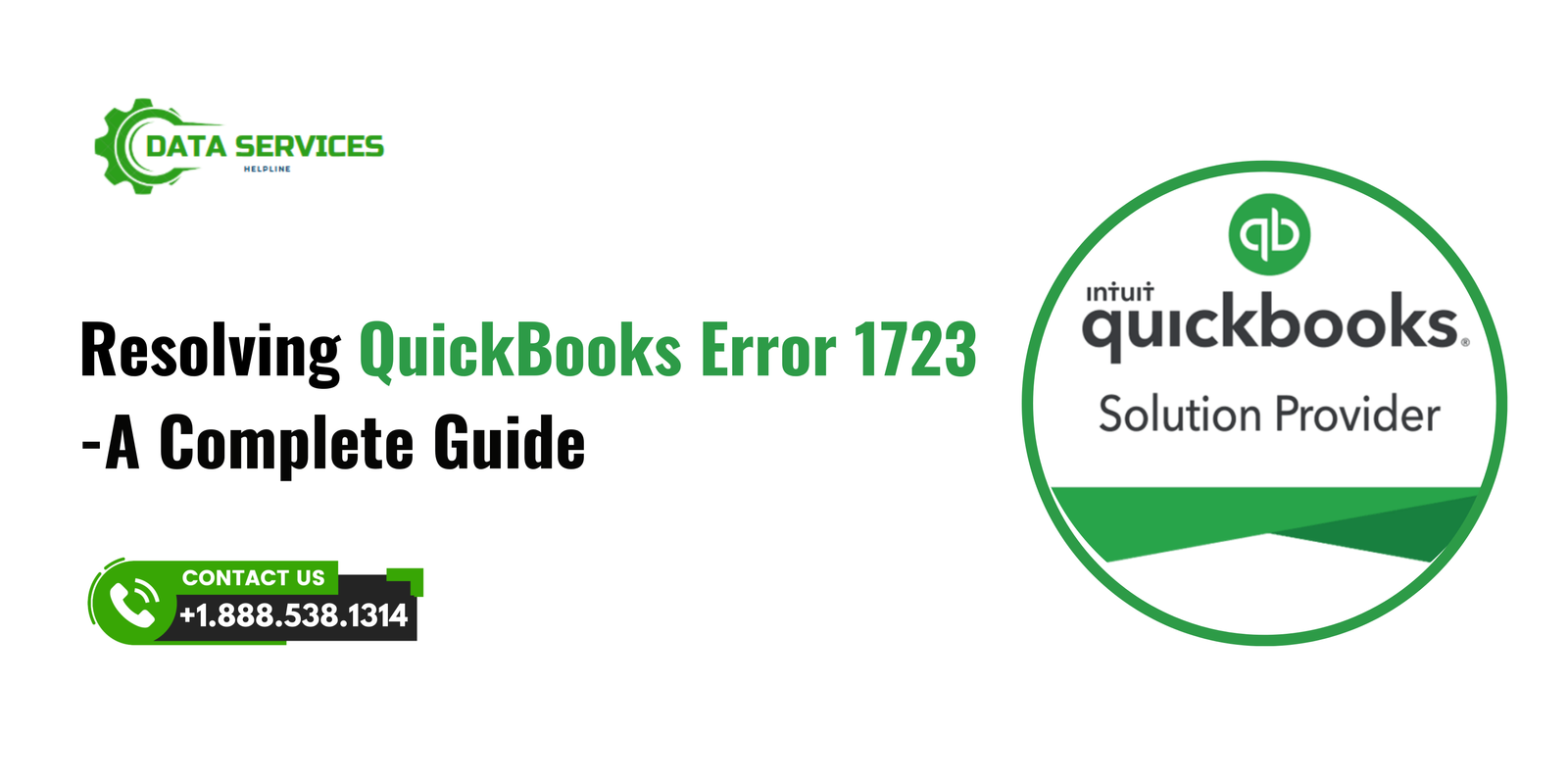QuickBooks is a powerful accounting software widely used by businesses of all sizes for managing finances. However, like any other software, it is not immune to errors. One such error is QuickBooks Error 1723, which can be particularly frustrating for users as it hampers the installation process or functioning of QuickBooks on your system. This article aims to provide an in-depth look at what QuickBooks Error 1723 is, the potential causes, and how you can resolve it effectively.
What is QuickBooks Error 1723?
QuickBooks Error 1723 is typically associated with issues related to the installation or uninstallation of QuickBooks software. It is classified as an installation error and is usually displayed with a message such as:
“Error 1723: There is a problem with this Windows installer package. A DLL required for this install to complete could not be run.”

This error suggests that QuickBooks is unable to complete the installation because it cannot access or run a required Dynamic Link Library (DLL) file. The issue could be related to system file corruption, Windows installer issues, or other environmental factors.
Causes of QuickBooks Error 1723
Several factors can trigger QuickBooks Error 1723. Understanding the root cause is essential for resolving the issue efficiently. Here are the common causes of this error:
- Corrupted or Missing DLL Files A common reason behind QuickBooks Error 1723 is corrupted or missing DLL files that are necessary for the installation process. If the installation package cannot access these files, the installation will fail.
- Faulty Windows Installer QuickBooks relies on the Windows Installer to perform installation tasks. If this service is malfunctioning or outdated, it can lead to Error 1723. This can happen due to corrupted Windows files, incomplete installation, or interference from third-party software.
- Damaged QuickBooks Installation Sometimes, if QuickBooks was not installed correctly or if some files were damaged during a previous installation attempt, it could lead to Error 1723. Incomplete installations or installations affected by external interruptions could also contribute to the error.
- System Configuration Issues Improper system configurations or conflicts between software and hardware components on your computer can also cause Error 1723. These issues might prevent QuickBooks from completing the installation or performing necessary updates.
- Incompatible Operating System QuickBooks may not be fully compatible with older versions of Windows or a 32-bit system trying to run the 64-bit version of the software. This incompatibility can result in errors like Error 1723.
- Interference from Antivirus or Firewall Sometimes, antivirus or firewall settings can block certain system operations, preventing QuickBooks from installing or accessing required files. This interference can lead to errors like Error 1723, especially when trying to install QuickBooks updates.
How to Resolve QuickBooks Error 1723?
Now that we’ve discussed the common causes of Error 1723, let’s look at how you can resolve this issue effectively.
1. Run the Windows Install/Uninstall Troubleshooter
Windows provides a built-in troubleshooter that can help identify and fix issues related to installation and uninstallation. Running this tool can automatically fix problems with Windows Installer.
Steps:
- Open the Control Panel and select Troubleshooting.
- Click on Fix problems with Windows Update.
- Follow the prompts and let the troubleshooter identify and resolve the issue.
2. Update the Windows Installer
Sometimes, an outdated or corrupted Windows Installer can cause Error 1723. Updating the Windows Installer to the latest version can resolve the issue.
Steps:
- Press Windows + R to open the Run dialog box.
- Type msiexec /unregister and press Enter.
- Then, type msiexec /regserver and press Enter.
- Restart your computer and try installing QuickBooks again.
3. Reinstall QuickBooks
If the issue is due to a damaged QuickBooks installation, reinstalling the software can fix the problem. Make sure to completely uninstall QuickBooks first and then reinstall it.
Steps:
- Open Control Panel > Programs and Features.
- Find QuickBooks in the list and click Uninstall.
- Once uninstalled, restart your system.
- Download the latest version of QuickBooks from the official website and install it again.
4. Repair QuickBooks Using the QuickBooks Install Diagnostic Tool
QuickBooks offers a tool called the QuickBooks Install Diagnostic Tool to help detect and fix installation issues automatically. Running this tool can help resolve Error 1723 by repairing any corrupted files.

Steps:
- Download the QuickBooks Install Diagnostic Tool from the official QuickBooks website.
- Run the tool and let it detect and repair any installation-related issues.
- Once the repair is complete, restart your system and attempt to install QuickBooks again.
5. Check and Update System Files
Corrupted or outdated system files may be preventing QuickBooks from accessing required DLL files, triggering Error 1723. Running the System File Checker (SFC) tool can help detect and repair corrupted files.
Steps:
- Press Windows + X and select Command Prompt (Admin).
- In the command prompt, type sfc /scannow and press Enter.
- Wait for the scan to complete and follow any instructions to repair detected issues.
- Restart your computer and check if the error is resolved.
6. Temporarily Disable Antivirus and Firewall
Sometimes, security software like antivirus or firewalls can block the installation of QuickBooks. Temporarily disabling them can help resolve Error 1723.
Steps:
- Disable your antivirus software or firewall temporarily.
- Try installing QuickBooks again.
- After the installation is complete, don’t forget to re-enable your antivirus and firewall.
7. Manually Register the DLL Files
If QuickBooks is missing certain DLL files, you may need to manually register them to resolve Error 1723.
Steps:
- Press Windows + R to open the Run dialog box.
- Type regsvr32 filename.dll and press Enter. Replace filename.dll with the name of the missing DLL file.
- Restart your computer and check if QuickBooks installs correctly.
8. Perform a Clean Boot
A clean boot can help identify if any third-party applications or services are conflicting with QuickBooks during installation. This can help you isolate the cause of the error.
Steps:
- Press Windows + R to open the Run dialog box.
- Type msconfig and press Enter.
- In the System Configuration window, click the Services tab.
- Check Hide all Microsoft services and then click Disable all.
- Go to the Startup tab and click Open Task Manager.
- Disable all startup items and restart your computer.
- Try installing QuickBooks again.
Conclusion
QuickBooks Error 1723 is a frustrating issue that can occur during the installation process, preventing you from setting up the software. By understanding the potential causes and applying the right troubleshooting methods, you can quickly resolve the error and get QuickBooks up and running again.
Whether it’s repairing your installation, updating system files, or using the QuickBooks Install Diagnostic Tool, there are various solutions to fix Error 1723. If the problem persists, it’s recommended to contact Data Service Helpline at +1.888.538.1314 for further assistance.
Frequently Asked Questions (FAQs)
QuickBooks Error 1723 is an installation error that typically occurs when there is a problem with the Windows installer or missing/ corrupted DLL files required for QuickBooks installation.
You can fix QuickBooks Error 1723 by running the Windows Installer Troubleshooter, repairing QuickBooks using the QuickBooks Install Diagnostic Tool, or manually registering the missing DLL files.
This error occurs due to corrupted or missing DLL files, faulty Windows Installer, incorrect system configurations, or conflicts with antivirus software.
Yes, performing a clean boot can help identify if third-party applications or services are interfering with QuickBooks installation.
Yes, QuickBooks Error 1723 is related to Windows Installer and system files, which are essential for the proper installation and functioning of QuickBooks.
